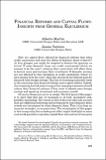Artículo
Financial reforms and capital flows: insights from general equilibrium
Date
2015Abstract
How are capital flows affected by financial reforms that relax credit constraints and raise the ability of domestic firms to borrow? At first glimpse one might be tempted to dismiss the question as trivial. If some domestic firms are credit constrained (which we assume to be the case!) relaxing their constraints will allow them to borrow more and increase their investment. If domestic savings are not affected by this relaxation of credit constraints (which we also assume to be the case!) then this increased investment must be financed with foreign savings. This line of reasoning naturally leads to the conclusion that financial reforms raise capital inflows. Indeed this reasoning has led many to argue that emerging economies should reform their financial systems if they want to absorb more foreign savings and speed up investment and economic growth.
Collections
View/


